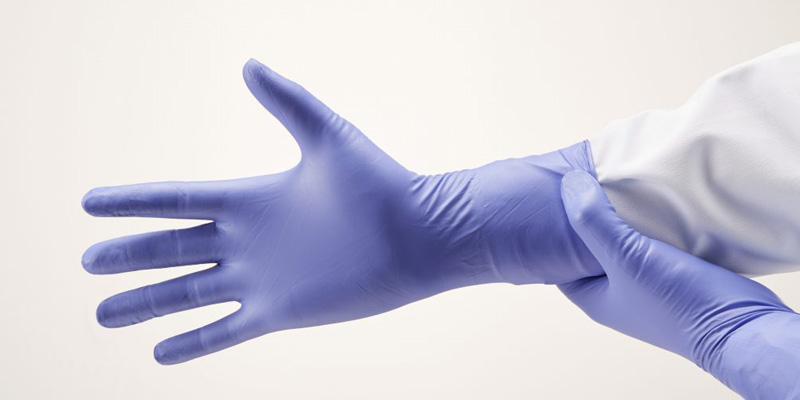2021/03/02 / By hqt / Tags:
Nitrile Gloves: Characteristics, Properties and Applications
Characteristics, Properties and Applications of Nitrile Gloves
Many modern professions require compliance with special safety rules, including the need to protect hands from adverse factors or the risk of infection. For this purpose, it is customary to wear protective gloves (latex, vinyl and nitrile). Latex gloves can cause allergies, vinyl gloves are not very durable, while nitrile gloves combine excellent quality characteristics and hypoallergenicity.
In many areas of life, latex gloves are very popular, especially in medicine. However, latex is made from the milky sap of rubber trees, which contain protein. This protein is an allergen, so latex can cause allergies if it comes into contact with the skin. Moreover, an allergic reaction is observed both in the person who wore gloves and in his client / patient, with whom he carries out the necessary manipulations.
This problem was solved with the invention of synthetic hypoallergenic materials - polyurethane, nitrile and neoprene.
Pros of nitrile gloves
The advantages of nitrile gloves are undeniable - they are thin and at the same time resistant to mechanical damage; their structure is not destroyed when interacting with various aggressive substances (eg chemical solvents); they are "breathable" - therefore they do not dry the skin.
The surface of some types of nitrile gloves is textured (non-slip) - these gloves are convenient to use if you use small tools. This feature was appreciated by people whose work requires precision and scrupulousness of movements.
This material is elastic (tensile limit is over 500%) and adapts to the shape of the brush. Thanks to the good mechanical memory of gloves, hands do not get tired for a long time. However, it quickly returns to its original shape after removal. Nitrile is able to withstand high temperatures - from 40 to 100 ˚С 130 ˚С. At low temperatures (down to -20 ˚С), it also retains all its quality characteristics.
For medical purposes, it is best to use nitrile gloves without dusting with cornstarch. After all, starch can get into a wound or damaged skin and cause irritation.
Nitrile gloves, developed for household purposes, contain lanolin, vitamins, and aromatic mixtures. They protect your hands from harsh chemicals found in cleaning products.
Nitrile is a material with good resistance to hydrocarbons, fats, oils, acids and organic solvents.
What are nitrile gloves made of?
The material of nitrile gloves is synthetic rubber, which is made from waste from the oil refining industry. More specifically, a mixture of acrylonitrile and butadiene is created. When this mixture is polymerized, a strong, elastic and dense film is formed - from which gloves are made.
To make nitrile gloves sterile, proteins, prions, bacterial spores and fungi are removed from the surface. There are many sterilization methods: treatment with chemical elements (ethylene oxide), gamma radiation, thermal exposure, filtration. A special identifier is placed on the glove packaging, by which you can determine the level of sterility.
What are nitrile gloves for?
In the medical industry, latex gloves do not lose their popularity: they fit the hand more tightly than nitrile gloves, therefore they are very comfortable. However, latex products can cause allergies in both the doctor and the patient, so many doctors abandon latex gloves in favor of nitrile gloves, despite the higher cost of the latter. They are often used by ambulance workers. They are also used in those medical industries where sterility is very important: blood sampling, laboratory research, dental treatment.
In beauty salons, as well as in piercing and tattoo studios, nitrile gloves are also in good demand. On the fingers, these products have a special texture, due to which a good grip on small objects and tools is provided.
Gloves are very convenient when performing household duties: cleaning, repairing, gardening. Durable and hypoallergenic, these gloves provide excellent protection against dirt and harsh cleaning agents. They are also used in the food industry.
For more information, please contact us.



